You can probably recall a time when you’ve had a great night’s sleep on a bed, yet your sleeping partner woke up complaining of aches and pains. Different people can have different experiences with the same mattress due to a host of factors, including their preferred sleeping positions, sensitivity to temperature fluctuations, and body type.
Body weight is one of the key factors that determines how firm—and how cozy—a mattress feels to you. Therefore, we always have multiple people with a range of body types interact with a bed while we test it. We want to get a sense of how it feels to a lightweight, average-weight, and plus-size person, each of whom will likely assign a slightly different firmness rating to the mattress.

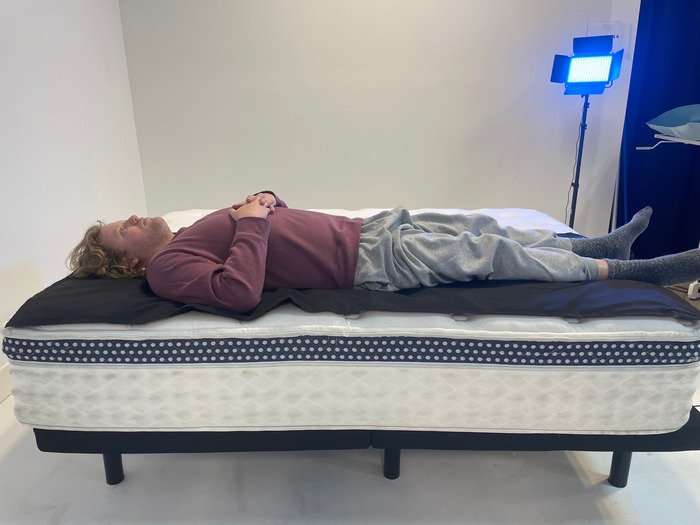
Disclaimer: We use terms like lightweight, petite, heavyweight, and plus-size to correspond with the weight ranges we’ve established to inform our mattress testing: “lightweight” (under 130 pounds), “average weight” (between 130 and 230 pounds), and “heavyweight” (over 230 pounds). We know that not everyone identifies with these terms, and how a mattress feels can be quite subjective! You’re the best judge of your own comfort, so we urge you not to feel restricted by our recommendations for certain weight ranges.
How Does Body Weight Affect Mattress Firmness?
A heavier person will sink into the surface of a mattress more than a lighter person. Typically, they’ll experience the mattress as softer, whereas the lighter person will say it’s firmer. That’s why the best mattresses for heavy people are firmer than the industry average.
For example, even though a mattress is labeled an 8 on our firmness scale, it may feel like a pleasantly firm 7 to a plus-size sleeper, and a rock-hard 9 to a petite person.
This example firmness scale below shows that Joe, an average-weight sleeper, felt the bed was softer than Marten, who is a heavyweight sleeper. Their ratings only differed by half a point. We don’t often see huge gaps between firmness ratings assigned by people with different body types, but going up or down by a number or two is common.

Testing Mattresses for Different Body Types
Mattress Clarity reviewers cover a wide range in their height and weight. This is great news for our reviews, because it means we can offer lots of different perspectives.
We try to have a lightweight, average-weight, and heavyweight person work with each bed we test. The reviewers compare notes and share their thoughts so the published review is as inclusive and thorough as possible.
Below, you can see pressure-sensitive maps from the same mattress from a lightweight tester (left) and a heavyweight tester (right). Note how the lightweight tester has a few more distinct pressure points on display in green! That’s evidence that this bed likely feels firmer to them.


The Best Mattress Firmness Level For Each Body Type
Here at Mattress Clarity, we use a firmness scale that ranges from 1-10, with 6.5/10 representing the industry standard of medium-firm. The following charts will help you identify the type of mattress that will work well for you:
Side Sleepers
| Body Weight | Suggested Firmness |
| Lightweight (under 130 lb) | 6/10 |
| Average (130 – 230 lb) | 6.5/10 |
| Heavyweight (over 230 lb) | 7/10 |
Back Sleepers
| Body Weight | Suggested Firmness |
| Lightweight (under 130 lb) | 6.5/10 |
| Average (130 – 230 lb) | 7/10 |
| Heavyweight (over 230 lb) | 7.5/10 |
Stomach Sleepers
| Body Weight | Suggested Firmness |
| Lightweight (under 130 lb) | 6.5/10 |
| Average (130 – 230 lb) | 7/10 |
| Heavyweight (over 230 lb) | 8/10 |
Combination Sleepers
Some sleepers start slumbering in one position and wake up in another. If you fall asleep on your side each night but wake on your back, you may be a combination sleeper. The best mattress for combination sleepers is one that’s supportive enough to keep your spine aligned and soft enough to cushion your joints.
If you can’t use your sleeping position to identify the best mattress firmness, you may want to select a mattress in the middle range for your body weight.
- Lightweight: medium (6-6.5/10)
- Average weight: medium-firm (6.5-7/10)
- Heavyweight: firm (7/10 or higher)
Your sleeping position can impact more than how your mattress feels; it can also affect sleep quality, health, and pain. Many experts say that stomach sleeping is not the best sleeping position. If you regularly rest on your stomach, you may want to consider making some modifications.
What’s the Best Type of Mattress for Your Body Weight?
Mattress manufacturers use a variety of materials. Here are a few of the most popular mattress types and how they feel for each body type:
Memory Foam
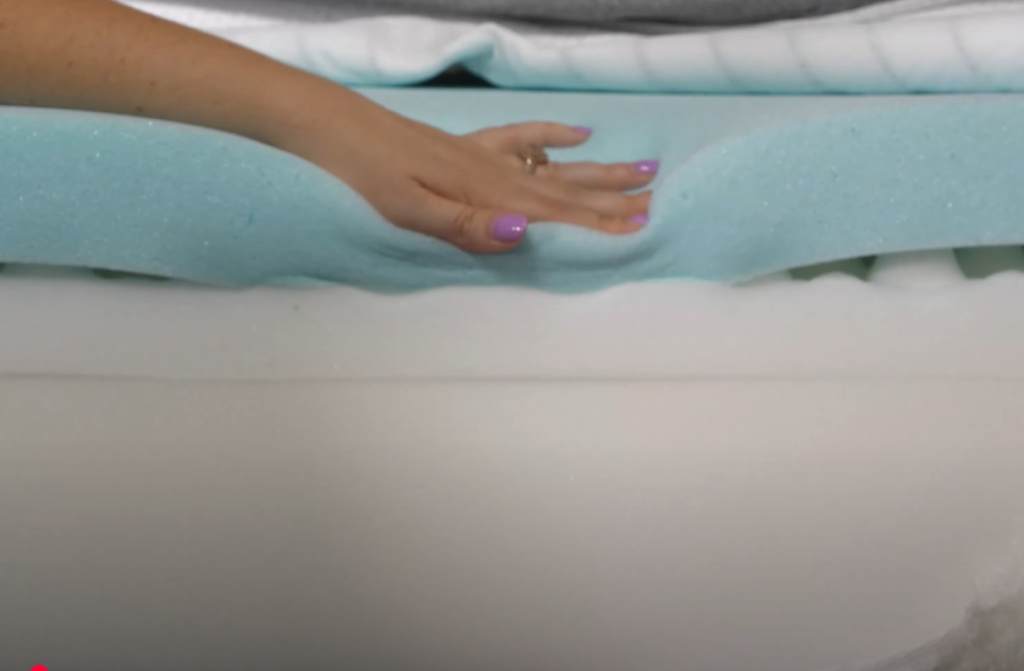
Memory foam mattresses are made from a material known as visco-elastic polyurethane foam that is soft and absorbent. Memory foam responds to heat and pressure and is known for its ability to mold around your body. Memory foam is a great material for side sleepers because it offers plenty of pressure relief. It’s also a good choice for lightweight and average-weight sleepers, but it may not be the best option for heavyweight sleepers who need a bit more support.
Who it’s for:
- Side sleepers
- Lightweight or average-weight sleepers
- People who need lots of pressure relief
Latex
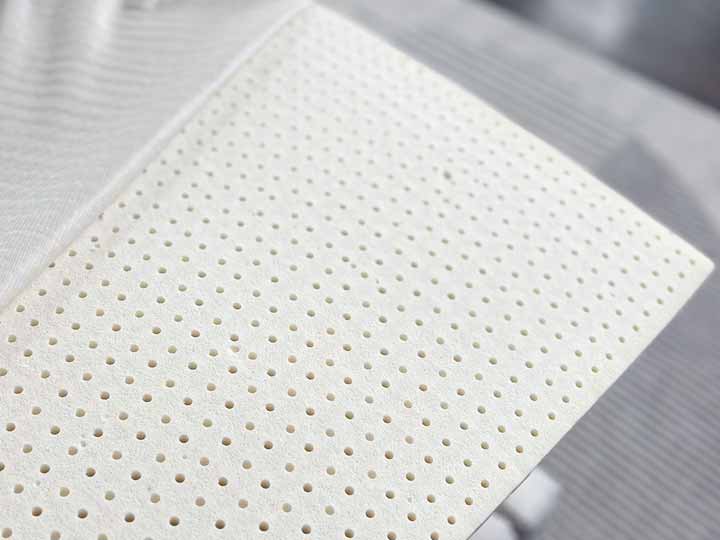
Latex mattresses have layers made from the sap of rubber trees. Latex has a unique feel that is often described as buoyant or bouncy. In contrast to the sinking sensation offered by memory foam, a latex mattress offers a lifted, supported sleeping sensation.
Latex mattresses tend to feel firmer than memory foam beds. Some models are entirely made out of latex, while others are latex hybrids featuring innerspring support layers and latex comfort layers. Lightweight side sleepers may prefer the light and airy Talalay latex, while heavier back or stomach sleepers may prefer the sturdier, firmer feel of Dunlop latex. Latex mattresses may not work well for side sleepers who desire a soft, sinking experience to better cushion and protect joints.
Who it’s for:
- People who prefer a bouncy and responsive feel
- Those who need more support
Hybrid
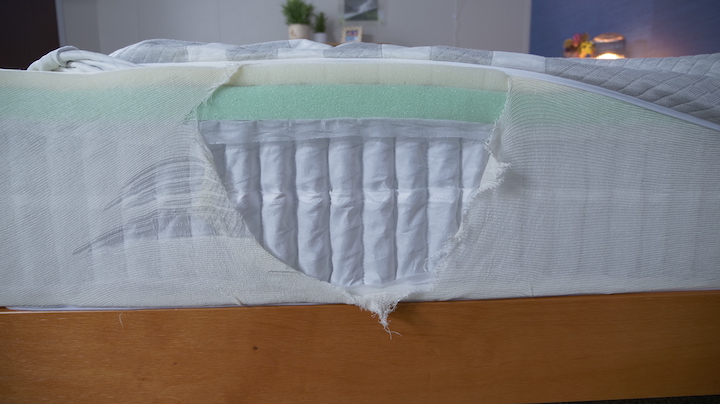
Memory foam hybrids offer the pressure-relieving benefits of memory foam, without many of the drawbacks. The combination of supportive innerspring coils and soft foam layers makes these mattresses more universally comfortable for all body types and sleeping positions. They also tend to sleep cooler than many all-foam beds.
Who it’s for:
- All body types and sleeping positions
- People who prefer a balanced foam feel
Innerspring
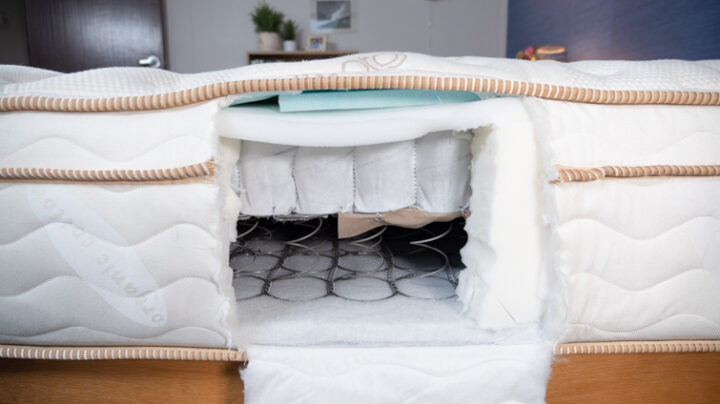
Innerspring mattresses offer ample support, and they tend to feel firmer than other types of beds. Innerspring mattresses have coils in the support layer and some thin padding on top, often in the form of a pillow top. Innerspring mattresses work well for stomach sleepers and heavyweight people, but they may not work well for lightweight people and side sleepers.
Who it’s for:
- Stomach sleepers
- Heavyweight people
- Fans of firm mattresses
- Those who like bouncy beds
FAQs
What’s the best mattress for lightweight people?
Lightweight people typically prefer soft and medium-firm mattresses. That’s because lightweight people put less pressure on mattresses, which can make the bed feel firmer than it would to an average-weight or heavyweight person. Soft and medium-firm mattresses should offer enough support and pressure relief for lightweight people.
What’s the best type of mattress for my body?
The best type of mattress for your body is one that accommodates your body weight, preferred sleeping style, and personal preferences. Lightweight people and side sleepers often feel more comfortable on soft mattresses, and heavyweight people and stomach sleepers typically feel more comfortable on firm mattresses. Back sleepers and average-weight people generally prefer medium-firm mattresses.
What’s the best mattress for heavy people?
Plus-size people typically prefer firm mattresses. That’s because heavier people put more pressure on mattresses and need extra support in order to maintain proper spinal alignment. Take a look at our list of the best mattresses for heavy people for some good options.

